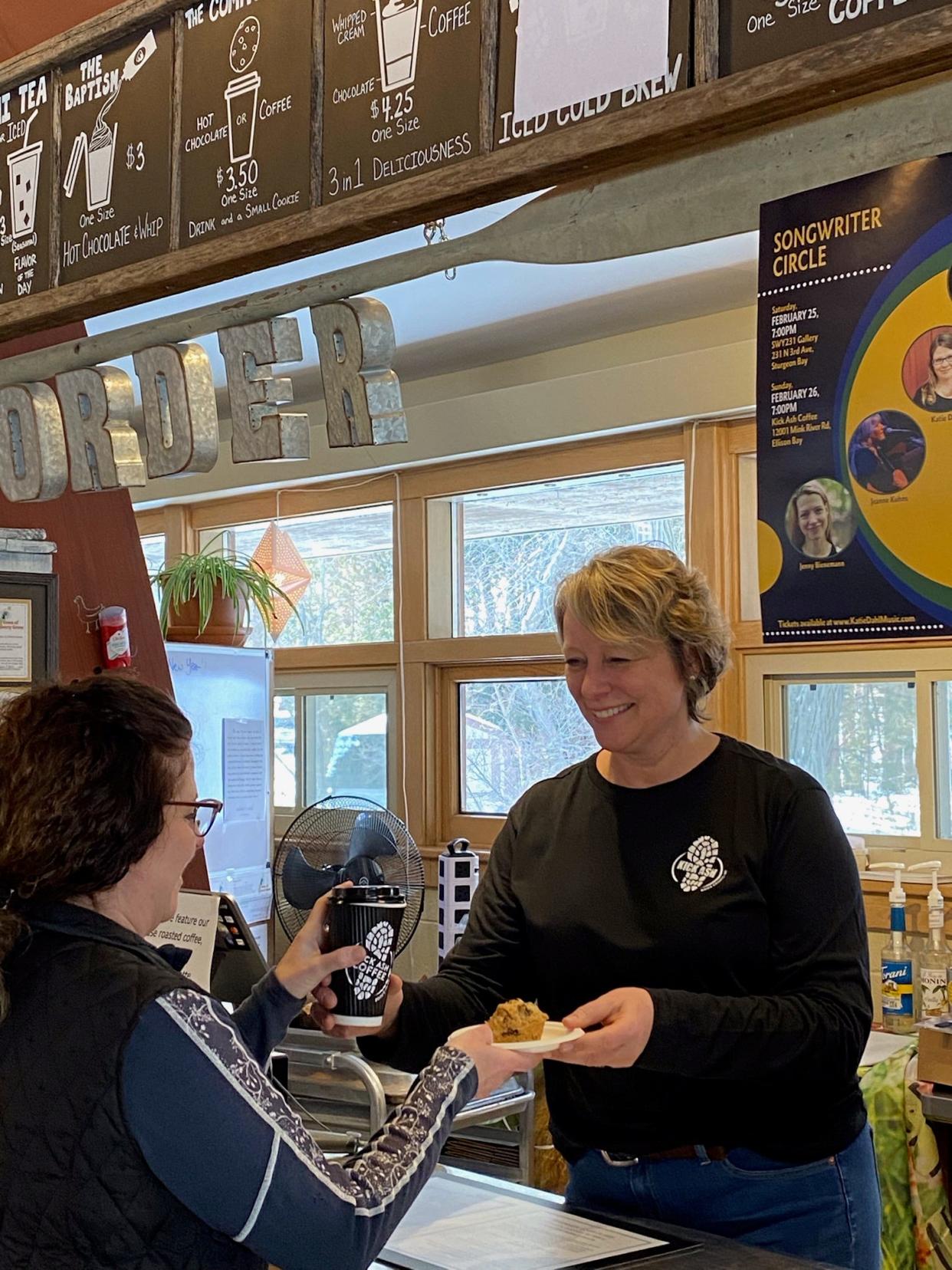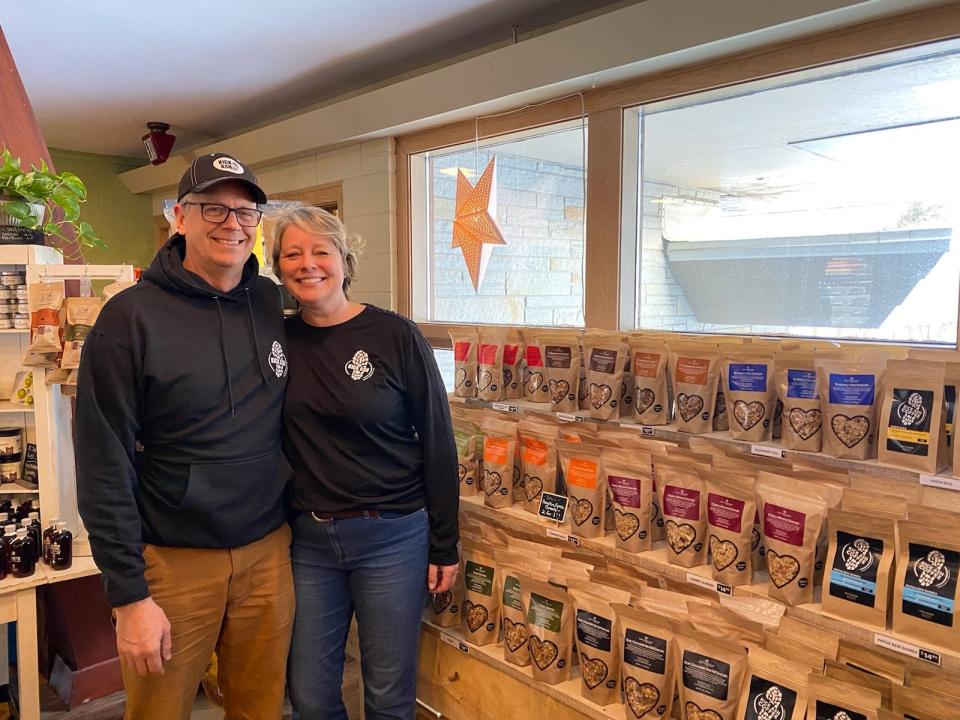Entrepreneurial program at DCEDC helps local businesses open and grow

ELLISON BAY - About four years ago, Carol Ash was looking to expand her business and move it into a new building. To help make that happen, she did what she now says is "the smartest thing I've ever done."
Ash and her husband, Christian, own Kick Ash Products, which started in 2014 as the maker of Door County Love Artisan Granola and since has added Kick Ash Coffees roasted by Christian, trail mixes and gluten-free baked goods to its product line. The Ashes opened a retail store, Kick Ash Door County, in Sister Bay in 2017 to add to its wholesale business but soon found they needed room to grow.
That's where the Entrepreneurial Training Program came in.
Hosted by the Door County Economic Development Corp., the program has been held each spring since 2012. It consists of one three-hour class a week for eight weeks, facilitated by business experts from the University of Wisconsin-Green Bay's Small Business Development Center, which offers the program in 12 northeastern and eastern Wisconsin counties. Over that time, 120 people have graduated from the Door County program, which includes scholarships and grants for its students.
Tara Carr, director of the University of Wisconsin-Green Bay Small Business Development Center, said the classes cover all aspects of owning and running a business, whether small start-ups or larger, million-dollar businesses. She said about half of the students taking the program are owners of existing businesses, the other half being people who are starting one or are interested in starting.
"We go over all the facets," Carr said. "It's about strategic planning, whether you're a person looking to start a new business or an existing business looking to expand."
One of the main objectives of the program is learning how to put together a business plan. Not just because it provides a direction to making the business profitable, but also because it's necessary to attract financing from lenders or investors. To aid in that, several years ago the program began using a short-answer workbook that students not only used to help put together their business plans but also could take home and save, so they could refer back to it or use it again if needed in the future.
"It helps people really think through their idea, put it on paper and get financing," said Michelle Lawrie, executive director of the DCEDC. "That's a big part of it."
That was a big part of what helped Kick Ash get into its new building in Ellison Bay back in 2019. Carol Ash was a physical therapist before her homemade granola became popular enough with friends to encourage her to launch her business, but she said she quickly learned that being a physical therapist didn't offer many lessons in running that business.
"When you start a business, you don't know all the things you don't know and wouldn't know to ask," Ash said. "It helps you think about things that are hard to know if you haven't been in business. Starting a business takes a lot of things that you don't pick up on in everyday life."
The Ashes were looking into buying the former Linden Gallery building at 12001 Mink River Road, and the business plan Ash developed in the Entrepreneurial Training Program in the spring of 2019, which included projections of costs and sales down the road, helped her get the financing to make the purchase happen. Their new store and kitchen opened that summer.
"It was instrumental in being able to get the building, putting together a business plan," Ash said.
Ash and Carr said one of the other important facets of the classes is figuring out who is your target market and understanding what they want.
"One of first exercises was to know who your customer is, to get inside the minds of your customers," Ash said. "It helped us look at our business, evolve into what we are now."
"Most businesses think they're going to sell to everybody," Carr said. "You really need to identify your target market and aim toward those individuals."
Ash said another vital part of the program for her was the chance to network and brainstorm ideas with other businesses and students in the class as things came up. Marketing, promotion and strategic planning are among the other subjects covered during the course.
"They were so encouraging," Ash said, "just really helped us through each stage."

Carr said not everyone who takes the program ends up opening a business or expanding as hoped, but she said in most cases that's because what they learned in the program saves them from heading into a business venture that they find isn't going to work.
"We've had people go through the program and realize maybe that the business they're looking at isn't that viable. And for us, that's a success," Carr said. "We're in the business of helping people realize their dreams. The last thing we want people to do is go bankrupt.
"It really comes down to doing due diligence, covering all aspects of the business. We find a lot of people who are really good at their craft, but when it comes to the business side of it, they need help."
The program also is important to the DCEDC because encouraging development and growth of local businesses owned by local people is more vital to the county's economic health than bringing in business from outside, Lawrie said.
"It's really important," Lawrie said. "Most of the success stories of economic development, people like to think of bringing in big businesses. But most of the successes are businesses that are already here or starting organically in our community. That's why we focus on entrepreneurship.
"Entrepreneurial activity is a huge part of what the DCEDC wants to do in the community. We want to make sure people are happy to reach out to us."
And Ash would encourage prospective business owners, and those owners considering changes to their businesses, to take the course, based on her experience.
"It's the smartest thing I've ever done," she said. "It's been invaluable."
FYI
The eight-week Entrepreneurial Training Program offered by the UW-Green Bay Small Business Development Center starts Feb. 7 at the DCEDC Business Center, 185 E. Walnut St., Sturgeon Bay. For registration information, visit https://wisconsinsbdc.org/services/events. For more information, contact DCEDC executive director Michelle Lawrie at michelle@doorcountybusiness.com or 920-743-3113, ext. 101.
This article originally appeared on Green Bay Press-Gazette: Entrepreneurial program at DCEDC helps local businesses open and grow

